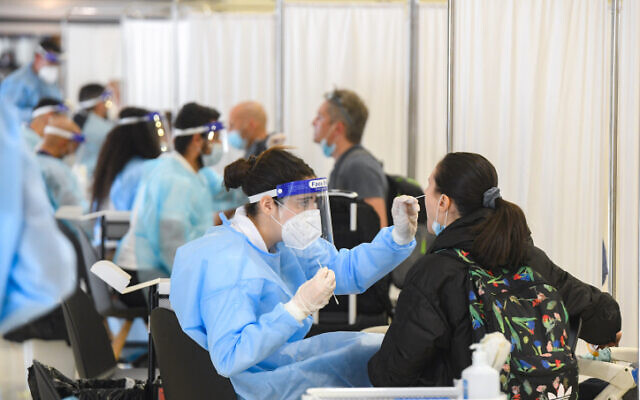Boy entering country from Moldova put in isolation after found with subvariant; scientists say no evidence it is more dangerous than Delta, but are watching it closely

A subvariant of the Delta coronavirus mutation raising alarm bells in the United Kingdom has been found in a child who entered Israel from Moldova, health officials said Tuesday.
The AY4.2 is being closely monitored by officials in the UK, and others have called for urgent research into the subvariant, though health officials say there is no evidence yet that it is driving an uptick in coronavirus cases in some places.
According to reports in Hebrew media, the subvariant was found for the first time in Israel in an 11-year-old boy who entered the country from Moldova. He was flagged at the airport and sent into isolation, Channel 12 news reported.
Health Ministry officials plan to hold a meeting on the worrying new strain, Walla news reported, amid fears that a new strain of the virus in Israel could reverse fading infection numbers after months of being pummeled by the fast-spreading Delta variant.
There were 1,486 new infections on Monday, the Health Ministry said, with another 701 Tuesday as of late afternoon. There were 354 people hospitalized in serious condition and the death toll reached 8,021, a day after crossing 8,000 deaths.
In the UK, where AY4.2 was first discovered, infection rates have remained stubbornly high, despite high rates of vaccination, and on Monday nearly 50,000 new cases of COVID-19 were recorded.

British Prime Minister Boris Johnson’s spokesman said the government was keeping a “close eye” on the AY.4.2 variant, but said there was no evidence it spreads more easily.
“As you would expect, we are monitoring it closely and won’t hesitate to take action if necessary,” he told reporters.
On Sunday, Scott Gottlieb, a former United States Food and Drug Administration commissioner, called for research into the subvariant.
“There’s no clear indication that it’s considerably more transmissible, but we should work to more quickly characterize these and other new variants. We have the tools,” he wrote on Twitter.
UK reported its biggest one-day Covid case increase in 3 months just as the new delta variant AY.4 with the S:Y145H mutation in the spike reaches 8% of UK sequenced cases. We need urgent research to figure out if this delta plus is more transmissible, has partial immune evasion?
— Scott Gottlieb, MD (@ScottGottliebMD) October 17, 2021
Francois Balloux, professor of computational systems biology at University College London, said AY.4.2 has two spike mutations found in other coronavirus variants and was first sequenced in April 2020.
The subvariant was “rare” outside Britain and there had been only three cases detected so far in the US, he added.
“As AY.4.2 is still at fairly low frequency, a 10 percent increase in its transmissibility could have caused only a small number of additional cases,” he said. “As such it hasn’t been driving the recent increase in case numbers in the UK.”
Bayroux, director of the UCL Genetics Institute, added: “This is not a situation comparable to the emergence of Alpha and Delta that were far more transmissible (50 percent or more) than any strain in circulation at the time.”
“Here we are dealing with a potential small increase in transmissibility that would not have a comparable impact on the pandemic.”
As reported by The Times of Israel
